#corset discourse
Text
losing my mind that someone thinks that some women wear Kim K waist trainers to the gym because historical costumers/dress history specialists dare to talk about corsets not being torture devices online
see screenshot below:

like
my guy
those are demographics with NEGATIVE overlap
#corsets#corset discourse#historical costuming#most historical costumers don't even waist-train and the ones who do#are aware that it's a temporary change that only lasts as long as you have your corset on#so working out in it serves no purpose#but again the vast majority of us wear corsets for...bust support and a base layer in period outfits. or in everyday life if that suits us#nobody is watching Bernadette Banner and then rushing off to buy a Walmart cincher. I promise you
333 notes
·
View notes
Text
Corset Discourse (Sort of), Full Metal Cuirass Edition

Bad back? Get your new stylish piece of shiny, tactical, bullet-proof, manly, metal medical equipment today! [attention there, sarcasm alert]
I know we're all bored and tired of Corset Discourse, but I stumbled across this and, although not concerning women's undergarments, but in this case 17th century medical back braces (and cuirasses):
The following two excerpts are from a biography of William III (1650-1702), and... you'll see:

From: John van der Kiste, William of Orange, Stroud 2003, p. 10.
Child being put into a support garment prescribed by the medical experts of the time in order to counter a diagnosed curvature of the spine:
"[R]estricting", plus the implication that a simple change of scenery to visit family improved the condition the likely brace-like supportive structure was mean to correct enough that it could be discarded.

From: John van der Kiste, William of Orange, Stroud 2003, p. 4.
Same child growing up into a physically functioning, if perhaps not fit adult whose day job involves getting shot at by enemy armies:
The cuirass was obviously worn as a medical support device in day-to-day life. The abundance of portraiture of said individual featuring armour could not possibly be due to the sitter wanting to emphasise his role as military commander, who, you know, sometimes participated in battle where a cuirass counts as sensible protective gear.
The author clearly frames the cuirass as a 'manly' solution to a serious medical issue, which is further outlined by the implication in the first excerpt that taking up hunting and visiting relatives had a positive effect on his condition, whereas the prescribed medical support garment was purely described as "restrictive", without giving any further context as to how the 17th equivalent of back braces were designed, intended to work or the wearer's prospects for improvement were.
Connecting the two excerpts, it is also remarkable how the author claims that the premature removal of the original back support brace or garment was deemed to be of "no longer any serious risk of deformity", yet the adult William of Orange is described as having a "visibly humped back." Some things don't add up here narratively.
Some other things don't add up historically, either; while it seems likely that William III indeed suffered from an abnormal curvature of the spine, contemporary sources do not describe him as having a "visibly humped back," and there is no record indicating he needed specific back support to take part in equestrian pastimes.
Ah yes, wearing medical device is "restrictive", someone hand the chap a manly cuirass and put him on a horse!
And last but not least, a question to any possible wearers of armour on this site: I am aware that plate armour is incredibly flexible, but in how far would a cuirass offer comfortable back support? I feel that there might be an argument made to it ensuring a straight posture, but whether it would be comfortable to wear over a longer period of time, or indeed helpful with any potentially painful back issues is a topic I do not feel knowledgeable enough to speak on-- your input would be greatly valued!
#history#17th century#corset discourse#sort of#history of medicine#william iii#william of orange#(since we don't know which it was)#back brace#armour#arms and armour#disability in media
17 notes
·
View notes
Text
i think most people who are into historical fashion know that a lot of stories about extreme tightlacing are fictional, but im not sure if they realize the stories were pornographic. or if they do know, they haven’t considered the implications of that. misogynistic men fetishized corsets bc they believed they made women smaller and weaker. the same way the men have fetishized extreme thinness and extreme fatness, because they make a woman weak and more easily controlled. bc misogynistic men want women weak and helpless!
13 notes
·
View notes
Text
Look, I get it if corsets are your thing and it bugs you to see it misrepresented, but just because corsets are comfortable for some, it doesn't mean they're comfortable for others (yes, even the 'well made, properly fitted' ones.) So if actors are calling for compensation for wearing them, we should believe them that that's their due. And the comfort of actual living people is more important than the reputation of an undergarment.
7 notes
·
View notes
Note
I'm sorry you're getting hate because you said oh corsets are this and this like do people sit around digging through the internet to find things to be offended with every day 🙄😮💨
Yeah fr !!!! People watch too much bridgerton. Hollywood rotted people's brains to the point where they project some insane meanings onto a simple linen undergarment. Its not that deep y'all lmao
4 notes
·
View notes
Text
Id like my two cents to the corset discourse (although its a different kind of discourse);
This is a corset: shapewear, boning, sturdy, goes down to your hips, creates support
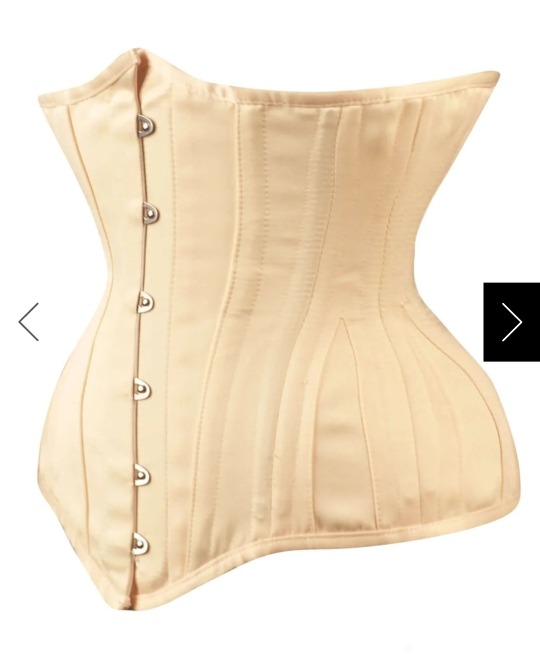
Barely a corset: super flimsy and does not create shape other than just generally squeezing you alltogether. Just kinda sits there. Lacing these tightly just straight up snaps the boning depending on your hip/waist ratio. From amazon
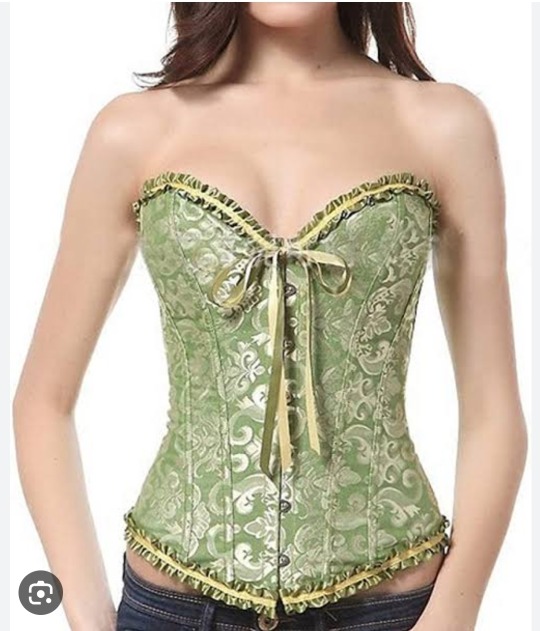
This doesnt even come close to a corset;
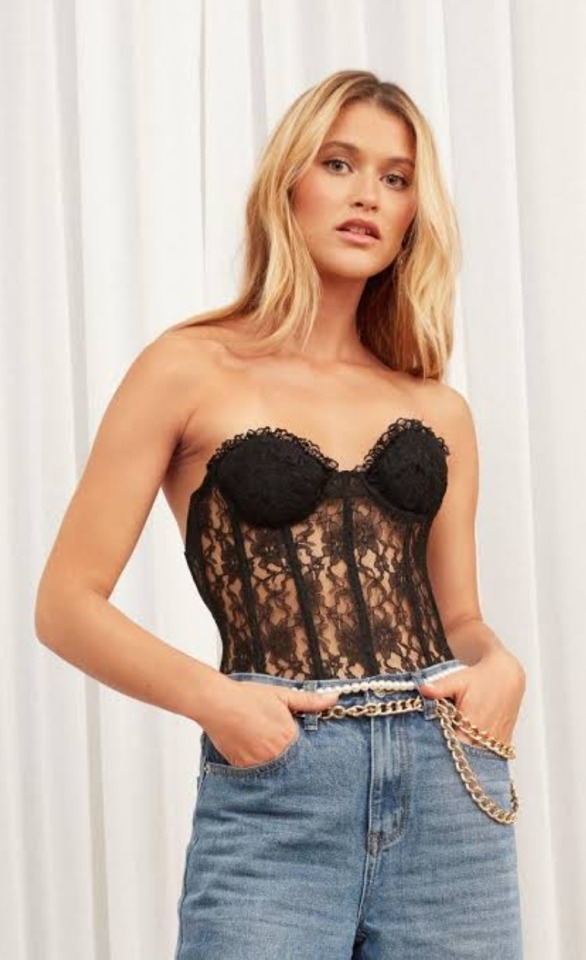
Nope

Not even trying
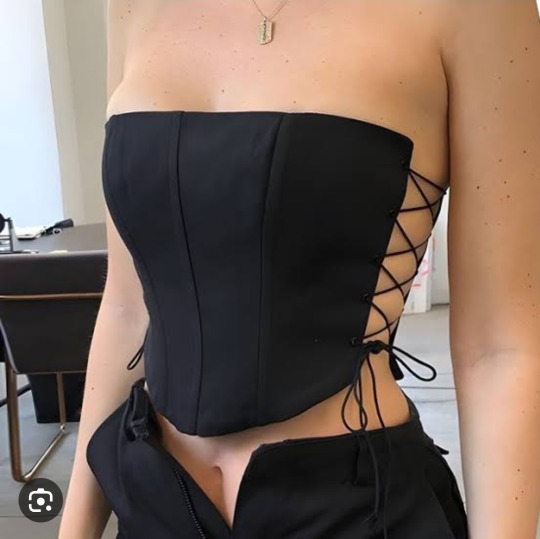
And yet they are all listed as corsets! I guess because they have lots of panels and often are laced up, but they are definitely not corsets. Which is annoying when im shopping for actual corsets online. Perhaps bodice is a more accurate way to describe them?
Long story short stop calling everything with lacing a corset thanks for coming to my ted talk
#corset discourse#corset#history#no hate to these tops btw#they can be cute#i just cringe when ppl call them corsets#historical fashion
4 notes
·
View notes
Text
I hate how "corsets aren't as evil as popular media portrays them to be" became "if you talk about anything wrong with corsetry you're simply misinformed because tightlacing was rare and corsets are meant to be comfortable"
I'm glad we're past the stage of thinking every woman in the victorian era was a pale red-cheeked tuberculosis afflicted waif of a woman tightlacing herself into dramatically fainting onto every nearby couch in the vicinity, vagina-ing herself into an early death and woefully ill-equipped to handle any emotion, but surely the opposite of an un-nuanced opinion is not just… the opposite of that mainstream opinion?
Like we don't have to flip all the way over to "corsets are universally great all the time." It's okay. We can say there was controversy over the corset and that sometimes they were a tool of the patriarchy because there literally was and they definitely were. There were entire feminist groups who opposed mandatory corsetry in the late victorian era. Like, on the wikipedia page for the corset, there is information about pro-feminist writings and articles arguing against corsetry in general and not just tightlacing. This necessarily means not every undergarment in women's history prior to like the 50s or whatever was made purely for back support because, again, women did not always like them, and it doesn't make sense for them to write about not liking them if it was just for innocent reasons.
Not to mention the fact corsetry being required to uphold all the layers men weren't required to have AND for ideas of decency is it's own issue people much smarter than me have talked about more eloquently. Is this not a part of basic "gender as a social insitution that must be repeatedly performed in order to uphold it" feminist theory? Like, when we complain about bras being required for "decency" as soon as someone gets hits female puberty, but also if you cover your chest too much or downright flatten your chest you're still doing it wrong because it's suddenly not feminine enough (read: problems someone could have had in the 19th century) no one goes "well, that's because bras are good for bust support, and women's clothes are built with the round cup shape in mind!" That sounds stupid!! No one is complaining that they're expected to wear uncomfortable bras or that there's anti-binding fearmongering because they don't know what bras are! So why apply it to *every* negative mention of corsetry?
Basically accuracy > "the mainstream opinion is actually wrong!" type responses applied where it doesn't belong.
110 notes
·
View notes
Text
i'm pretty sure that when someone says "complaining about corsets is white feminism" they mean that it sounds like a second-wave concern (i.e., like a feminist concern from before intersectional analyses became a thing). the reason why complaints about corsets sound like a second-wave (de facto, white feminist) feminist thing is because second wave feminists did enjoy writing about how women's standards of dress and personal hygiene are in large part coerced by patriarchy. most of the popular feminist think pieces that ppl have read about high heels, shaving, make-up, uncomfortably tight clothing, etc. prolly have their origins in second-wave thought.
those critiques are often valid and have been historically important for raising consciousness around how pervasively patriarchy influences women's lives.
HOWEVER,, the reason why someone might say "complaining about corsets is white feminism" derogatorily, would be because in their proper historical context, corsets were not like stilettos in modern society. they were a basic undergarment that was important for bearing & distributing the weight of heavy layers of clothing as well as supporting the back and bust. so, in their historical context, there's nothing inherently un-feminist about corsets/stays.
NEVERTHELESS,, corsets made today for say, period dramas, are typically costumes first and foremost, and therefore aren't created with practical quotidian wearability in mind. it is thus possible for two things to be true: 1. corsets/stays are not inherently regressive, un-feminist garments, and 2. corsets made for period costumes are often made poorly / laced too tight / hurt their wearers due to a confluence of sexist factors.
so, to thread the needle as clearly as possible, it is both a sexist labor rights violation that any actress be pressured into wearing an ill-fitting, painful costume AND white-feminist hand-wringing to blame corsets for being regressive instead of humans for creating sexist labor rights violations.
#lmao why do corsets bring out the most annoying possible discourse#also OFC actresses blaming corsets instead of labor rights violations are just trying not to ruin their careers!!
43 notes
·
View notes
Text
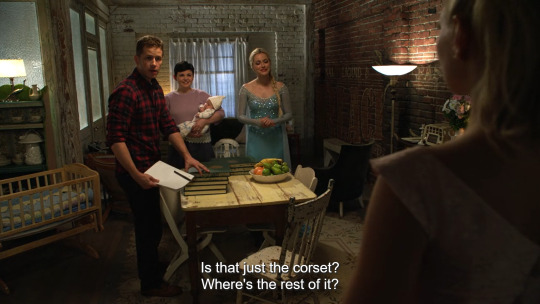
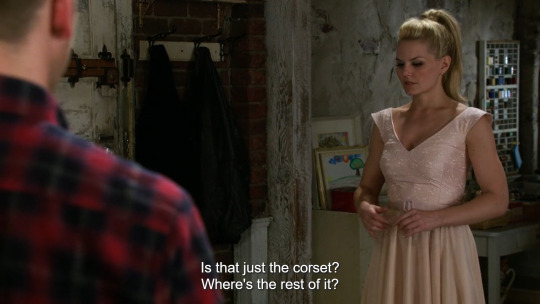
this joke doesn't work because Elsa's dress is very much a 2013 dress
#the corset? girl you are wearing the exact same thing in blue#i like the dress but with the ponytail is looking 1950s#and this is weird but i feel it's too pink lmao idk if i see emma wearing this shade of pink#even in the pilot it was more of a hot pink#i can understand it if what they were going for is emma trying to be vulnerable with hook. hence the more 'innocent' look but idk#also i need a breakdown of the costumes of this show because i am aware that there's discourse about this online lmao#ouat rewatch#i am rambling
7 notes
·
View notes
Text
she's never going to read this, but it's still interesting
so the person with the extremely cold corset takes last night has now decided that dress history folks are straight-up lying about the purpose of corsets. because we just love them so much, I guess?
she found this ad:

and therefore knows corsets were Totally About Waist Reduction First And Foremost, Always And Forever, Amen
I have. some thoughts.
the main one being that nobody claimed corsets were never used to waist-train back then
the secondary one being that many ads for "form-reducing corsets," at least the ones that I found, make a distinction between "normal" corsets and their product:


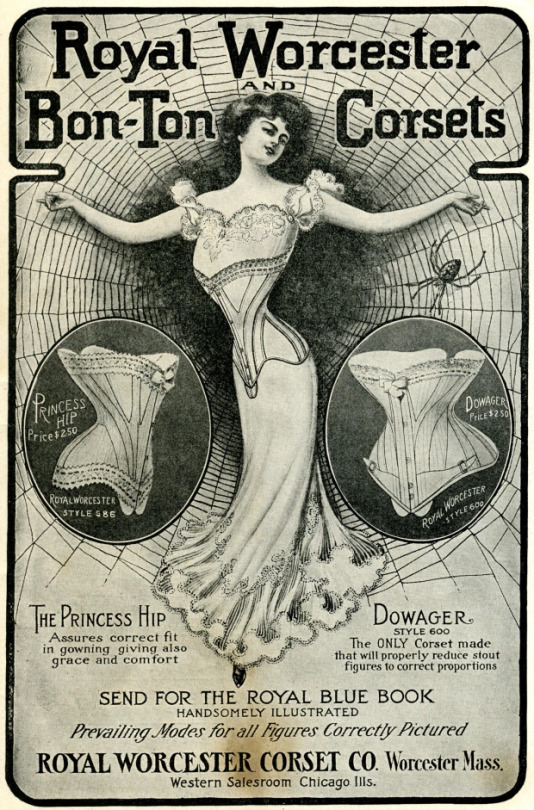
It's a specialty product, not what the average woman is wearing on a daily basis. Is its existence messed up? Yes! But nobody has been disputing that pressure on women to look a certain way, and fatphobia, are awful. The issue in question is: was the primary function of an average (in this case Victorian/Edwardian) corset waist reduction? It seems to me that the ad supplied- again, for a specialty garment that was not seen as an ordinary corset -does not prove OP's point.
so let's look at some ordinary corset ads, shall we?

(don't freak out too much about the "baby/child corsets"- I've worked with extant examples many times, and they're just lightly stiffened vests. you couldn't lace a kid down in them if you tried- not that you should, obviously)

(Pliability, elasticity, comfort- but no mention of waist reduction as a selling point)

(this one is an unusual design, but I'm including it because it mentions support- and specifically breast support -not once, but twice. It also instructs ladies to measure their waists OUTSIDE their clothing- which will result in a larger measure even than we commonly use for custom corsets nowadays. note that a 2" lacing gap was common, per a corsetiere quoted in Valerie Steele's The Corset: A Cultural History)
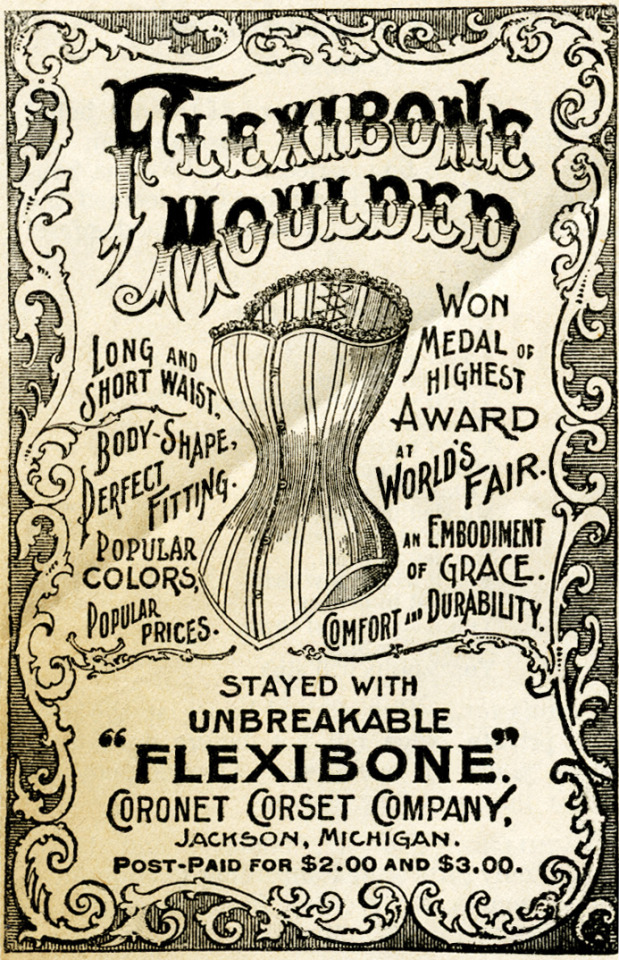
(Flexibility and comfort, yet again.)
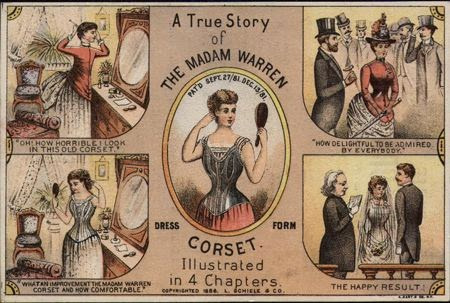
(Rather a ridiculous one, including the implication that you need an elegant corset to snare a husband and therefore economic security and love, but the bottom left text says "What an improvement the Madam Warren corset. And how comfortable.")
so we've clearly got comfort, support, and ease of movement at the forefront of the average consumer's mind, for so many ads to mention such thing. a number also don't have much text at all:

(The Celebrated EEE is my hypothetical burlesque name, but I digress.)
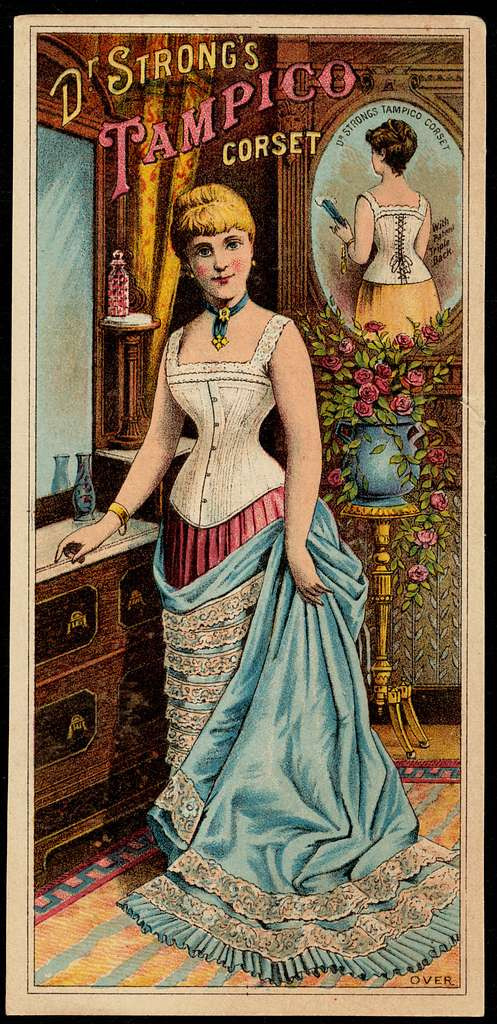
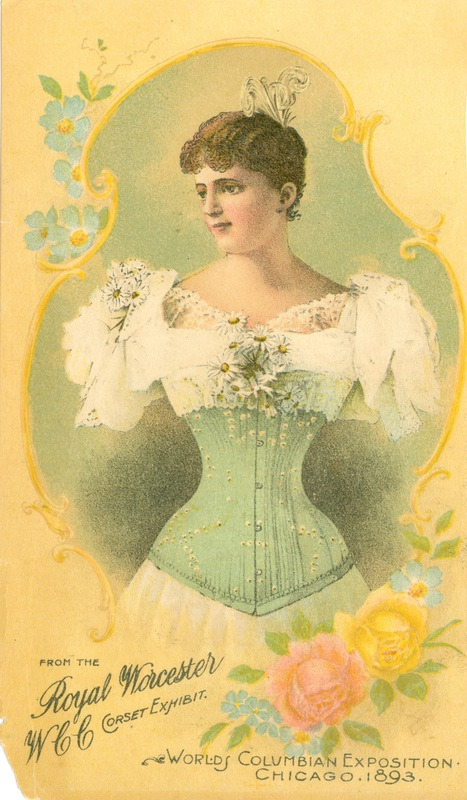
of the first twenty random ads that come up when I do an image search for "corset advertisement," eleven mention health and/or comfort, and only one directly mentions waist reduction- while advertising, again, a separate specialty "reducing" corset.
am I saying it never happened? absolutely not. I have NEVER been saying that. tightlacing did happen. obviously reducing corsets existed. I would not deny any of this
am I saying that, clearly, support and comfort were thought so high on the average corset-wearer's priority list that manufacturers played to those attributes more than waist reduction when constructing/advertising corsets, implying that they are NOT, in fact, the same thing as a Kim K waist cincher? yes
(file under: things I cannot believe I have to fucking say, and yet here we are)
#corsets#long post#fatphobia mention#body issues tw#corset discourse#genuinely can't fathom how 'are historical corsets just as-seen-on-TV waist trainers' is a real question here
195 notes
·
View notes
Text
"god you big MISOGYNISTS why don't you just spend 1000 dollars on a custom corset and then you'll see how great they are" will never not entertain me, but i must admit "it's white feminism to complain about substandard working conditions" is a new gloss for it.
(especially great considering one of the actresses that article mentions disliking wearing the corsets was simone ashley. hmmmmmm.)
7 notes
·
View notes
Text
https://en.m.wikipedia.org/wiki/Corset_controversy
just reading through the literal wiki page on 1870s corset discourse (consisting of people who actually wore corsets day to day arguing back and forth about them) would be good for everybody
#replacing the old myth 'every Victorian womans ribcage was deformed' with new myth 'only male doctors and boring women disliked corsets#and no 1800s woman ever didn't wear corsets as a statement'#newsflash they've been a subject of discussion that women have been a part of for at least 200 years#and more than anything. people in the 50s or whatever 'making up things about 1800s corsets'#were literally wearing extremely restrictive undergarments themselves. its not talking about the 'bad old days' thinking we are superior#(a line of argument that does not intend to but ends up actually perpetrating an idea of a 'good old days')to engage with existing feminist#discourse. but also lol 1870s pro ana girls.#and more than anything. we have not changed all of this could be read in a comment field today
5 notes
·
View notes
Text
.
#i just want to add something to the momrry jumpsuit discourse#i see people saying when i would have been a mum i would never wear a jumpsuit because not handy#but can we also let the real mums speak in every variation#i have many roles and interests and one of them is fashion#so yes i wear and wore jumpsuits even though unhandy#i wore corsets breastfeeding like is it handy? absolutely not#do i find it important to express myself through fashion and don't let children get into the way of it? also yes#so when this wouldn't go for the majority of mums probably#its not like all mums wear practical clothes#if anything i wear so much h is wearing before h did it#mums and fashion are so diverse!#also it doesn't have to end if you enjoy fashion/ looks#however you call it#I don't disagree with some points of the discourse but it isn't as black and white as#mums only wear practical clothes#i dont!
8 notes
·
View notes
Note
you are retarded. the corsets aint gonna fuck you.
Lmao get fucked xddddd
2 notes
·
View notes
Text
currently losing the idgaf war because idc about Emma Watson or live action Disney remakes but if you really think she’s wrong about refusing to wear a corset for her dress/costume or that specific element is what made the dress in the beauty and the beast live action bland you deserve to die idc
1 note
·
View note
Text
Corset discourse really likes to talk in sensationalizing absolutes but historically speaking a corset is just a kind of garment. They could be uncomfortable and painful or they could be well fitted and supportive. They could be hyper-fashionable or they could be brutally practical. You could tightlace them or you could wear them with no reduction whatsoever. Most corsets were probably somewhere in the middle. Like bras. Or shoes. To say they were never perceived as restrictive or used as tools of enforcing dangerous/misogynistic beauty standards is like saying women's shoes never restrict freedom of movement. Patently untrue, but that doesn't mean those shoes have some deeper moral good or evil and it certainly doesn't mean we can use that fact to draw sweeping generalizations about the relationships of entire centuries of women to their own bodies. Corsets, like all clothing, exist in context.
12K notes
·
View notes